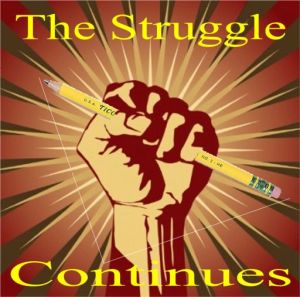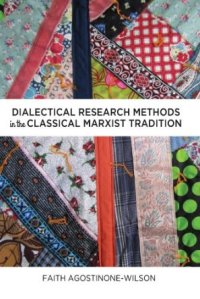 MARX, CAPITAL, AND EDUCATION: TOWARDS A CRITICAL PEDAGOGY OF BECOMING
MARX, CAPITAL, AND EDUCATION: TOWARDS A CRITICAL PEDAGOGY OF BECOMING
A new book by Curry Stephenson Malott and Derek R. Ford
Published by Peter Lang: New York, Bern, Berlin, Bruxelles, Frankfurt am Main, Oxford, Wien, 2015. XX, 165 pp.
Education and Struggle: Narrative, Dialogue and the Political Production of Meaning. Vol. 5
General Editors: Michael Peters and Peter McLaren
Print: ISBN 978-1-4331-3111-0 pb. (Softcover)
Print: ISBN 978-1-4331-3112-7 hb. (Hardcover)
eBook: ISBN 978-1-4539-1602-5
Order Online: http://www.peterlang.ch/index.cfm?event=cmp.ccc.seitenstruktur.detailseiten&seitentyp=produkt&pk=87064
Outline
With the contradictions of capitalism heightening and intensifying, and with new social movements spreading across the globe, revolutionary transformation is once again on the agenda. For radicals, the most pressing question is: How can we transform ourselves and our world into something else, something just? In Marx, Capital, and Education, Curry Stephenson Malott and Derek R. Ford develop a «critical pedagogy of becoming» that is concerned with precisely this question. The authors boldly investigate the movement toward communism and the essential role that critical pedagogy can play in this transition. Performing a novel and educational reading of Karl Marx and radical theorists and activists, Malott and Ford present a critical understanding of the past and present, of the underlying logics and (often opaque) forces that determine the world-historical moment. Yet Malott and Ford are equally concerned with examining the specific ways in which we can teach, learn, study, and struggle ourselves beyond capitalism; how we can ultimately overthrow the existing order and institute a new mode of production and set of social relations. This incisive and timely book, penned by two militant teachers, organizers, and academics, reconfigures pedagogy and politics.
Educators and organizers alike will find that it provides new ammunition in the struggle for the world that we deserve.
Contents
Contents: Becoming through Negation: Revisiting Marx’s Humanism – From Revolution to Counterrevolution and Back Again? The Global Class War and Becoming Communist – Becoming Communist in the Global Class War: Centering the Critique of the Gotha Programme – The «Cynical Recklessness» of Capital: Machinery, Becoming, and Revolutionary Marxist Social Studies Education – Teaching Ferguson, Teaching Capital: Slavery and the «Terrorist Energy» of Capital – Connecting «Economic Bondage« to «Personified Capital»: Another Step toward a Critical Pedagogy of Becoming.
About the Authors
Curry Stephenson Malott (PhD in curriculum and instruction, New Mexico State University) is Assistant Professor of Educational Foundations in the Department of Professional and Secondary Education at West Chester University of Pennsylvania. Dr. Malott is a regular contributor to the Journal for Critical Education Policy Studies.
Derek R. Ford’s (PhD candidate in cultural foundations of education, Syracuse University) professional writing has appeared in Educational Philosophy and Theory; Critical Studies in Education; Policy Futures in Education; and Studies in Philosophy and Education. He currently teaches in the Social Justice Studies Program at Hobart and William Smith Colleges.
Praise for Marx, Capital, and Education
“In Marx, Capital, and Education, Malott and Ford advance one of the boldest and [most] unmitigated analyses of education in the history of the field. Their unflinching and scholarly critique of the relationship between capitalism and compulsory education helps to reground the field of critical pedagogy, framing a renewed ‘revolutionary Marxist pedagogy.’ Their careful undertaking of Marx and contemporary scholars of Marx situate this text as a must-read across multiple disciplines including philosophy, political science, government, and education – a true classic in the making.” (Sandy Grande, Associate Professor and Chair, Education Department, Connecticut College)
“This is an essential text for all of those interested in the continuing potential of Marxism as an analytic tool and as a political movement, with implications for critical pedagogy and a truly liberatory education. It traces the history of the use of Marxist theory in education in ways that are insightful, and it provides a key set of categories for reading and using Marx in a ‘postmodern’ age. A rare achievement in educational scholarship.” (Dennis Carlson, Full Professor, Department of Educational Leadership, Miami University)
“This book boldly interrogates the internal contradictions of capital with the aim of galvanizing a critical pedagogy of becoming, a pedagogy capable of providing the conceptual and analytic resources necessary to locate and pry open spaces in education from which to push those contradictions to their breaking point so as to transform capitalism into communism. The authors patiently explain the dialectical logic of capital’s internal contradictions that incline capital towards self-negation, paying particular attention to capital’s compulsive quest for surplus value; they deepen this explanation with an exploration of Marx’s appropriation of dialectics from Hegel. Setting these explanations in motion and keeping capital’s thirst for surplus value firmly in view, Malott and Ford confront and intervene in some of the main debates related to education under capital, including the relation between educational labor and the reproduction of capitalist social relations, and the relation between race and class. This book propels forward the revolutionary struggle for liberation from class society.” (Deborah P. Kelsh, Professor of Teacher Education, The College of Saint Rose)
“Malott and Ford point to the horizon of possibilities that open up when Marx is put back into Marxism. Their bold advocacy of critical pedagogy as a self-conscious movement towards communism is a welcome antidote to the bourgeois fluff that has come to pass as ‘critical’ in education for too long. Marx, Capital, and Education is written by revolutionary educators for revolutionary educators.” (Grant Banfield, Lecturer, Faculty of Education, Humanities and Law, Flinders University, South Australia)
“Malott and Ford present a rigorous theoretical framework grounded in the actual practice of communist movement(s). Their approach to educational pedagogy is a must-read for anyone with a radical consciousness seriously concerned with not just interpreting, but changing the world.” (Eugene Puryear, author of Shackled and Chained: Mass Incarceration in Capitalist America; Organizer with the ANSWER Coalition)
“Malott and Ford in this exceptional work place capitalism ‘squarely within the crosshairs.’ Vague talk concerning issues of social justice is replaced with concrete explorations of our present historical moment within the horizon of communism and educators’ place in moving toward that horizon within a process of a critical pedagogy of becoming. This book will move critical thinkers toward the horizon. It is about time.” (William M. Reynolds, Associate Professor of Curriculum, Foundations, andReading, Georgia Southern University)
“Twenty-five years after the collapse of the Soviet Union, world ‘leaders’ continue to directly and indirectly promote anticommunist disinformation and propaganda. Today one is casually and smugly dismissed as passé or out of touch if they are still ‘gullible’ enough to fight for communism. Opposing this relentless capital-centered offensive which depoliticizes people and intensifies anticonsciousness, Malott and Ford have boldly put communism on the agenda. With courage, conviction, and serious analysis they show how and why existing political-economic arrangements can and must be replaced by a human-centered society and economic system, a world free of exploitation, alienated relations, and the division between mental and manual labor. To this end, the authors skillfully sketch the organic connections between critical pedagogy, transformation, and Marxist and Hegelian dialectics in order to advance ‘a pedagogy of becoming.’ Here the future lies within the present and negation is affirmation. But Malott and Ford remind us at every turn that this does not mean that phenomena unfold deterministically.” (Shawgi Tell, Associate Professor of Education, Department of Social and Psychological Foundations of Education, Nazareth College)
“This book is a weapon to be used not merely against capital, but in the revolutionary struggle to overthrow capitalism and realize a communist future that enables the becoming of humanity. In an era in which Marxist educational theorizing is making a comeback, Malott and Ford represent the best of a new generation of revolutionary thinkers who do not settle for merely interesting academic inquiry, but rather illustrate how deep intellectual inquiry can inform answers to questions about how we can teach, learn, and take action in the construction of a proletarian offensive in the global class war. Malott and Ford unapologetically embrace the goal of creating a new set of social relations that enable the absolute movement of becoming, that is communism. They put capitalism in the crosshairs and refuse to take cover under the empty shells that democracy, social justice, or domesticated critical pedagogy have become. Instead they return to Marx, offering crystal clear theoretical and practical responses to questions at the heart of conversations about how we can create not only new pedagogies, but a new world, free from the scourge of capitalism.” (E. Wayne Ross, Professor, Faculty of Education, University of British Columbia)
“This is a hugely important and impressive book by…two increasingly influential revolutionary Marxist theorists/activists. They assert and closely argue that ‘in order for education to contribute to the generation of a counterpower it has to place capital squarely in its crosshairs.’ They open up the field of possibilities for revolutionary education, enabling the imagination of ‘a world without the exploitation and oppression that characterizes capital.’ This book is hard-hitting and uncompromising. It is scholarly. It is activist. It is a remarkable addition to contemporary critical education and Marxist theory.” (Dave Hill, Professor of Education Research, Anglia Ruskin University, England; Chief Editor of the Journal for Critical Education Policy Studies; Co-founder and Co-organizer of the annual International Conference on Critical Education).

Curry Malott
***END***
‘Human Herbs’ – a song by Cold Hands & Quarter Moon: http://www.youtube.com/watch?v=Au-vyMtfDAs
Posted here by Glenn Rikowski
Glenn Rikowski @ Academia: http://independent.academia.edu/GlennRikowski
Volumizer: http://glennrikowski.blogspot.com
Rikowski Point: http://rikowskipoint.blogspot.co.uk/

Derek R. Ford



















